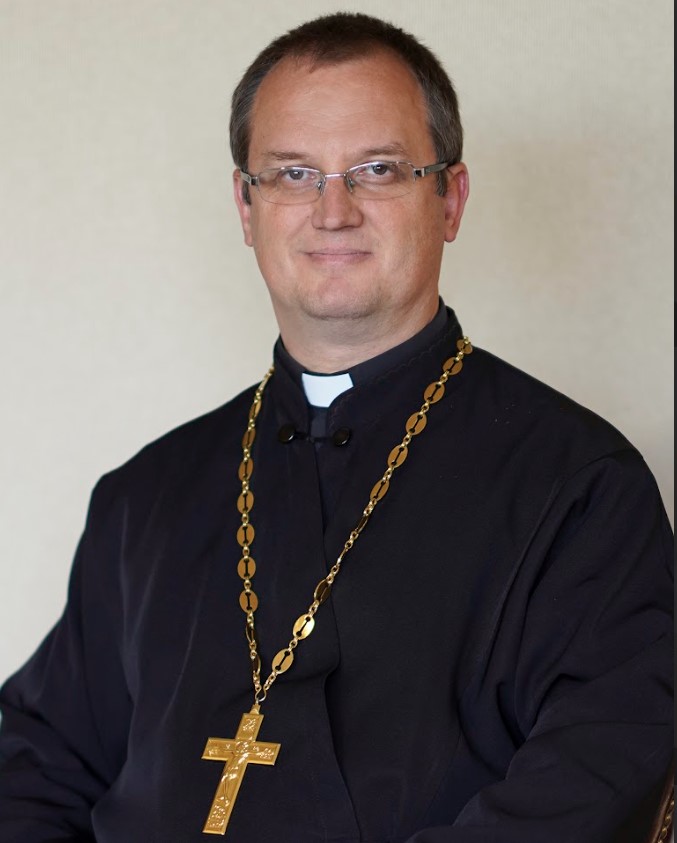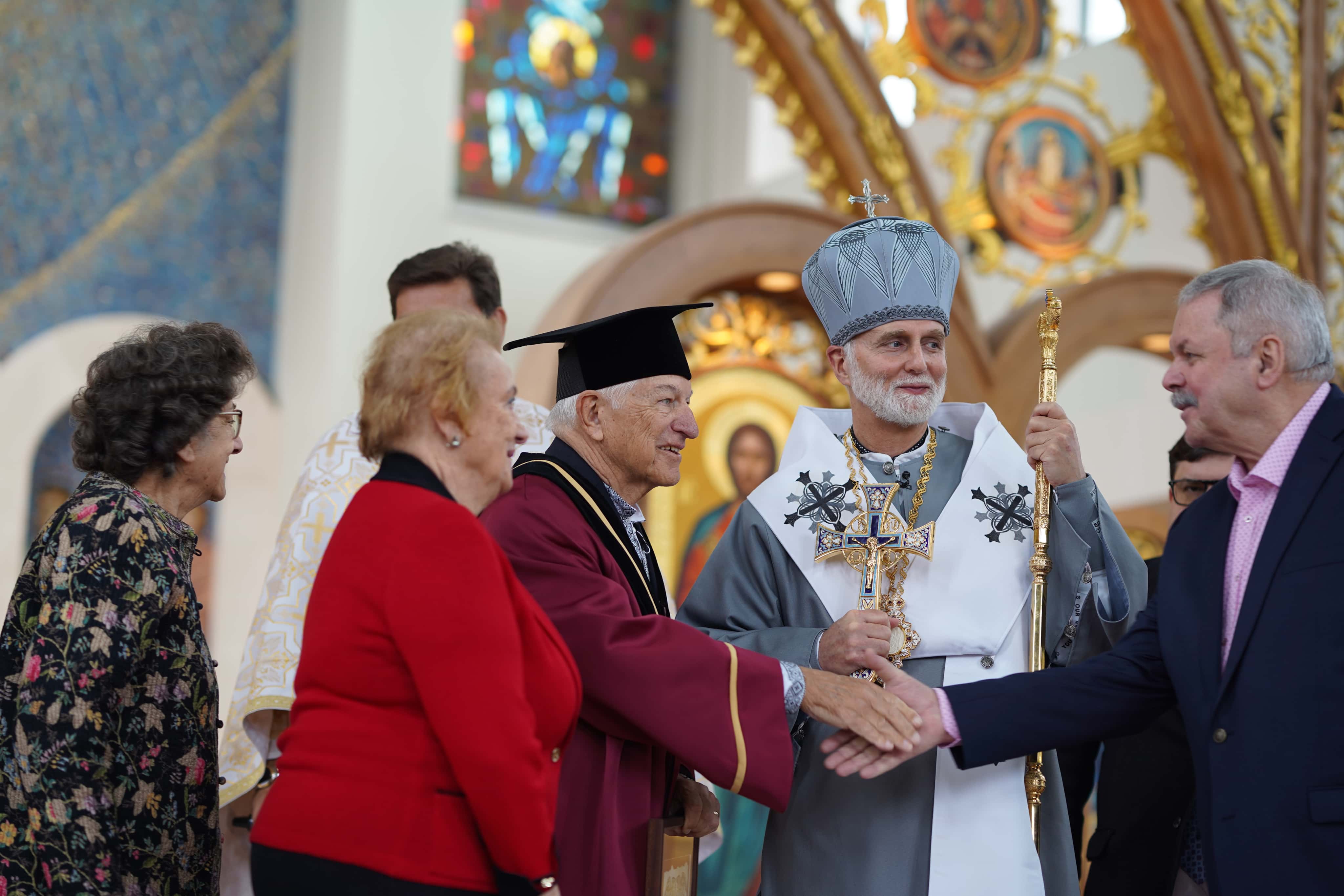METROPOLITAN TRIBUNAL

Rev Mykola Ivanov
mivanov@ukrcatholic.orgThe Metropolitan Tribunal handles all matters of Church Law (Canon Law) and serves to mete out justice for those who have a grievance. In particular, and also the majority of cases, the Tribunal handles matters of the Mystery of Marriage. The Metropolitan Tribunal is the Court for the Archeparchy of Philadelphia, PA and the Eparchy of St. Josaphat in Parma, OH. We also serve as the Appeal Court (Court of Second Instance) for the Eparchy of Stamford. Our Court of Second Instance is the Roman Catholic Archdiocese of Philadelphia.
The Metropolitan Tribunal is staffed with personnel who are experts in Canon Law. They serve as Judicial Vicar, Judge, Defender of the Bond, Promoter of Justice, Advocates and Auditors, and Experts (Psychologists or Medical Doctors).
Judicial Vicar: Very Rev. Mykola Ivanov J.C.L.
Judge: Msgr. Peter D. Waslo, J.C.L.
Defender of the Bond: Rev. Ruslan Romanyuk, J.C.L.
Promoter of Justice: Msgr. Ronald Popivchak
Notary: Sofia Zacharczuk
Peritus (Expert): Joe Remlin, M.S., Clinical Psychology, Counseling Psychology
THE ANNULMENT PROCESS
Many people find themselves in a situation where their marriage ended in divorce. The Catholic Church, in its concern for the salvation of people, offers a pastoral solution to lift the burden of divorce. This is needed especially for those who seek to enter another marriage or have married and want to receive the Mystery of Marriage in the Catholic Church. Also, there are people who have met someone with a previous marriage and the person, although divorced, needs to have their marital situation rectified.
The Catholic Church recognizes all marriages to be valid whether the persons were Catholic, Protestant, Orthodox, Jewish, Muslim, etc. As one who has gone through a divorce, one has to enter Civil Court to have the marriage ended or dissolved. The same is with the Catholic Church. The Metropolitan Tribunal serves as the Court to prove a marriage was invalid due to circumstances before the wedding. The Decree of Nullity is a declaration that the Mystery (Sacrament) was invalid from the time of the wedding day. The person or persons (parties) are then free to marry in the Catholic Church if so desired.
This brings up a question (and a concern) by many who have children. There is a misconception that a Decree of Nullity makes children born of a marriage illegitimate. Canon Law provides that the children are not illegitimate. The reason being, marriage has two parts: one, the Sacramental part and second, a natural part. The Metropolitan Tribunal only concerns itself whether the marriage was Sacramental or not. If it was not, there is still the civil aspect which must be respected. In fact, if a person is negligent in providing alimony or child support, the Metropolitan Tribunal may place a Prohibition upon the negligent party. That means the person may not marry in the Catholic Church until proper restitution has occurred.
After the parties have finalized their divorce, one may petition the Metropolitan Tribunal with the proper completed documentation. This is proof that the marriage is definitively broken and reconciliation will not be pursued. The person seeking the annulment (Petitioner) fills out the required paperwork (Questionnaire) and submits it with the required documents.
Once the petition has been accepted, the Metropolitan Tribunal deems whether it has jurisdiction. If it does, then the reason for the marriage not being valid is established (Grounds). This/these Grounds are based upon the information provided in the Petitioner’s questionnaire. When that has occurred, the other party, the ex-spouse, (Respondent) is cited along with witnesses provided by both parties. Another question and concern people have is whether the Respondent may stop the procedure by not participating. After a period of time, if the Respondent does not respond to the notifications from the Metropolitan Tribunal, the Respondent is declared absent and the petition proceeds.
In most cases, there is no need for a personal interview. One may schedule an appointment if they feel better speaking rather than writing their responses. When all the information has been gathered, the parties may review the responses of each and the witnesses (Testimonies).
After the information has been reviewed, the testimonies are sent to the Defender of the Bond, whose role it is to insure all proper procedures were followed and if the Grounds were proven to judge the marriage null and invalid. Once that has occurred, the petition is then given to a Judge to write the opinion of the Court (Sentence).
When that is completed, the parties are informed the Decree of Nullity has been granted. Both the Petitioner, Respondent and the Defender of the Bond may appeal to the Court of Second Instance. If not, then the case is complete.
To begin a petition, please click on the form on this page. When completed, please send it to the Metropolitan Tribunal. Once it has been received, it will be docketed, and the people involved, the Respondent and witnesses will be contacted. The Petitioner does not have to contact these people. In the event, the Respondent’s address is unknown, the Petitioner may supply a family member’s address or a close friend’s address. The Metropolitan Tribunal will also do an online search.
The length of the process depends. The timing of all the information being received is a major factor. The quicker the better. Also, time has to be given for the Respondent to be able to respond. As stated earlier, if the Respondent does not respond, that person will be declared absent and the case proceeds. The amount of cases in the Metropolitan Tribunal also affect the speed of the cases. Since it is a small Tribunal, the amount of cases slows down the process for everyone since all have to be taken care of.
The fee the Metropolitan Tribunal asks is $300.00 for cases from the Archeparchy of Philadelphia. ($500.00 from the Eparchy of St. Josaphat in Parma, and $100.00 for an Appeal from the Eparchy of Stamford. If one appeals to the Archdiocese of Philadelphia, it is an additional $100.00).
As stated earlier, this role of the Metropolitan Tribunal is to offer people the opportunity to seek salvation and rectify their situations. If payment is not received, it will not affect the outcome of the decision of the Court.
What has been described is the Formal Process where a marriage was celebrated in the Catholic Church, or other marriages recognized by the Catholic Church to be valid. Other procedures are Lack of Form, where a Catholic married outside of the Catholic Church without permission. Another procedure is when a person has married a person who was previously married to a person in a valid marriage. These are called Previous Bond Marriages (Ligamen). These are Documentary Cases and invalidity is proven by documents. Other procedures are the two persons not baptized at the time of the wedding (Pauline Privilege) and or the Pope dissolving a marriage of a baptized person and a non-baptized person (Petrine Privilege).
A new procedure introduced by His Holiness, Pope Francis is called the Bishop’s Process. If both parties agree with the Ground(s) cited and agree not to appeal the decision, then the Archbishop will write the Sentence and Decree of Nullity. It’s a Formal Case but expedited.
These procedures are in place to help anyone who wants to rectify their marital situation, taking into consideration how it happened.

